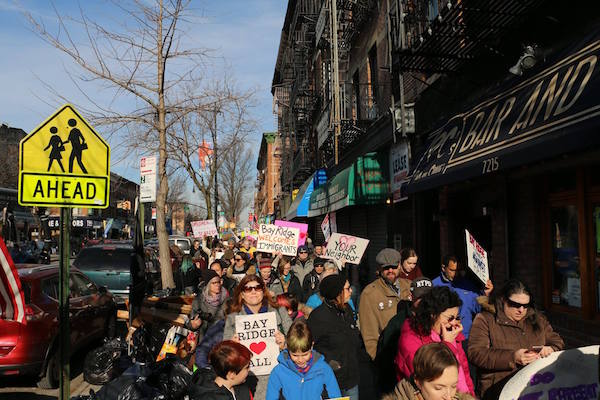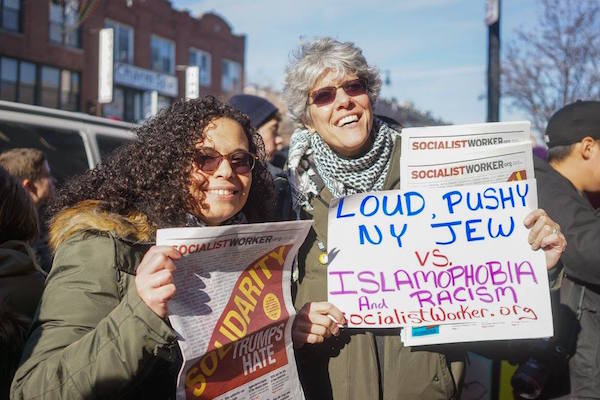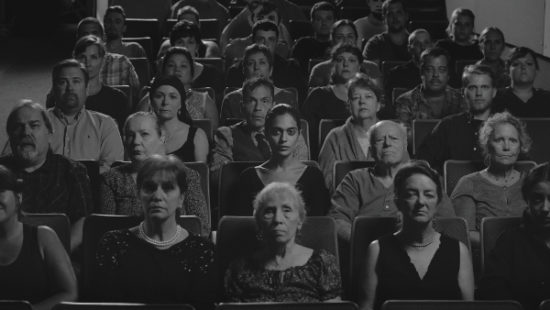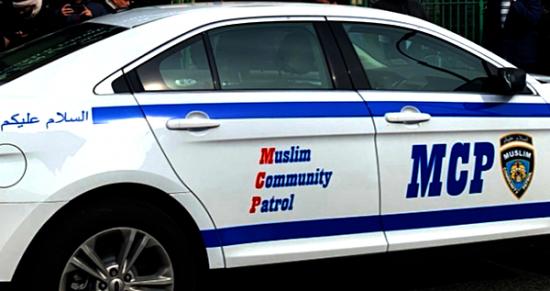‘Little Palestine’
Bay Ridge group pushes back vs. Islamophobia
sans politicians and beyond electoral cycles.

October 6, 2017
They hate us,” said Mariam, a Palestinian born and raised in Bay Ridge, a small south Brooklyn neighborhood. “In the few places we both frequent, like McDonald’s or some of the coffee shops, they’ll scowl or scoff at me.”
Mariam’s neighborhood is home to one of the largest Muslim and Arab populations in the country. Walking through Bay Ridge, it’s impossible not to be drawn to the racks of spices displayed in the corner bodegas. Cloves, cardamom, and cinnamon waft through store fronts and linger in the dining rooms of Palestinian and Yemeni restaurants like Yemeni Cafe and Tanooreen, two popular restaurants Arabs from around the city flock just for a bite of Mansaf or Lamb Haneeth.
In a small neighborhood like Bay Ridge, no one is a stranger. If you are, you’re likely an NYPD informant.
But the neighborhood hasn’t always been ‘Little Palestine’ as it’s known today. Only a few decades ago, it was an enclave for European immigrants. Italians, Norwegians, and Greeks populated the area and evidence of their presence can still be found not only in the bars and restaurants they own, but also, and more pressingly, in the nationalism and bigotry they proudly display on their lawns, in their workplaces, and on the streets when they encounter their Muslim neighbors.

Ever since scores of Arab migrants arrived in the neighborhood, ethnic and racial tensions have been fermenting. Each election cycle creates a new wave of Islamophobia in this small Brooklyn community. While driving down 78th Street, a residential stretch near the neighborhood center, it’s difficult not to notice the American flags hanging outside almost every house, often next to a Trump lawn-post or sticker. On the next street over, houses are flagless. Taking a stroll down 5th Avenue, one of Bay Ridge’s main commercial hubs, the segregation is just as stark. One block is filled with storefronts and window displays in Arabic, advertising events and products to the Muslim community, while the next block is filled with bars and beer halls draped with emblems of American nationalism.
Mariam’s father is the co-founder of the Islamic Society of Bay Ridge, a mosque and community center on 5th Avenue. Inside the center, the space is calm and inviting. People can often be found reading or chatting with passersby about upcoming events concerning the society or community matters. In a small neighborhood like Bay Ridge, no one is a stranger. If you are, you’re likely an NYPD informant.
The year of 2016 was a terrifying one for Muslims. Islamophobic hate-crimes in the United States spiked by 89 percent, according to a Huffington Post survey. In another report by the Southern Poverty Law Center, data shows the number of anti-Muslim hate groups tripled in 2016. These numbers far surpass the post-9/11 Islamophobic backlash that many Muslim communities experienced. The re-emergence of the ‘war on terror’ rhetoric, coupled with Trumpism, has led to a resurgence in unchecked Islamophobia; this time empowered directly by the leader of the so-called “world’s greatest democracy.”
“We need to build something based in this community, that engages everyone in our community, and that addresses injustice and oppression.”
In the midst of nationwide resistance to Trump, a newly formed activist group in Bay Ridge is fighting back; this time choosing to rely on its own collective organizing instead of putting its faith in opportunistic politicians and deceptive elections. Formed in response to an assault on a Muslim woman in Bay Ridge in the wake of the Paris attacks of November 2015, the group has since blossomed into a vibrant hub for community organizing. Since its formation, Bay Ridge for Social Justice (BRSJ) has organized a number of solidarity campaigns, marches, and panels to get the local community involved in politics.
Yasmine Kamel, an Egyptian American who moved to the neighborhood a few years back, is one of the leading figures of the group. Often spending her days between work and organizing meetings, while simultaneously navigating the slowly crumbling MTA system, Yasmine’s activism has become a full-time job. And Trump’s election has pushed her to work overtime.
“We need to build something based in this community, that engages everyone in our community, and that addresses injustice and oppression,” she explains while commuting home from work one day. it’s no surprise that Yasmine, a long-time member of the NYC Socialists and a scholar of Islamophobia and U.S. imperialism, is one of the main organizers of BRSJ. “It’s a solidarity group that’s looking to build connections, to solidarize different sections of the community, focusing most heavily on combatting Islamophobia,” she explains.
In the spirit of Martin Luther King’s anti-racist organizing, the group organized its first March Against Hate, soon to become an annual event on MLK day, in 2016. Hundreds attended the solidarity protest and marched through the streets of Bay Ridge showing solidarity with the Muslim community and making it clear that they will no longer tolerate the rampant Islamophobia spreading throughout the city. Although the first march was a success, the group remained small until the Trump election.
“After the Pulse nightclub shooting, when Trump was starting to exploit terrorist attacks for his own political agenda, we put together a public forum and made the argument that the LGBT community and the Muslim community should fight together against Islamophobia and hatred against LGBT people,” Yasmine explains. “[At the event] we had LGBTQ people speaking and receiving massive applause from women wearing hijab or people who had just come back from evening prayer. It was a beautiful display of solidarity.”
Recently, the group has been focusing on connecting the struggle against Islamophobia with the struggle for immigrants’ rights. In early April, the group organized a picket in front of the homes of New York State Assembly members Nicole Malliotakis and Ron Castorina, who are suing the city to stop the deletion of the IDNYC database, which contains information on the immigration status of hundreds of thousands of New Yorkers. If this information is kept in the records, Immigration and Customs Enforcement (ICE) will have a powerful weapon with which to intensify its attacks on the undocumented community.
The picket of around 50 protesters represented the Black, white, Arab and Latinx diversity of Bay Ridge. There was a long speakout in front of Malliotakis’s house, as one speaker after another spoke against the surveillance of Muslims, about the importance of IDNYC for transgender and homeless people, and the opioid epidemic in Staten Island that is now being blamed on immigrants. Even white Irish attendees spoke up about the discrimination against Irish immigrants in the early 20th century, connecting the past struggles against racism to today’s war on immigrants.
Perhaps what sets the group apart most is its approach to electoral politics; it simply chooses to work outside the gaze and power of politicians and the ups and downs of election cycles.
Bay Ridge is polarized when it comes to elections. Much of the white, working class immigrant population, attracted by hyper-nationalism and the illusion of better jobs, votes Republican. The Arab and Muslim community, on the other hand, leans towards the Democrats. In 2016, most of the Muslim community not only voted for Bernie Sanders in the primaries but actively campaigned for him outside mosques and community centers in the neighborhood. It was hard not to “feel the Bern” when one of the major representatives of the Arab community in Bay Ridge, Linda Sarsour, was chosen by Sanders to be a delegate at the Democratic National Convention (DNC).
Sarsour’s organization received a number of threats and hate mail in the months leading up to the election including a note with the drawing of a Christian crusader decked in armor kneeling to pray in front of a cross with the words ‘It’s time to choose sides’ written next to the image.
As with almost every other type of hate crime or national epidemic of any kind, politicians took the stage to express their grief and remorse over the killings of Maulama Akonjee and Nazma Khanam, two Muslims murdered in broad daylight on a busy avenue in downtown Queens. Again, in the week after Trump’s election to office, politicians including Mayor Bill DeBlasio, released statements condemning the spike in hate crimes against Muslims and those perceived to be Muslims.
Hate crimes continue unabated leading one to conclude that the real drivers of discrimination in Bay Ridge have not been confronted yet and, if they have, the old model has proven ineffective.
They often use terms like ‘tolerance’ and ‘American unity,’ and caution people against the turn to violence instead of understanding and ‘dialogue’. These speeches and statements erase the very roots of the hate and intolerance that exists. They caution against violence when NYC, under their jurisdiction, is home to one of the largest and most violent law enforcement organizations in the United States: the NYPD.
So how does a community rattled by the harrowing experience of surveillance and constant threat respond?
In other neighborhoods, task forces or committees have been formed to help monitor crimes in a community or to facilitate discussions and involve community members in addressing certain aspects of community life, in this case, hate crimes and death threats. Unfortunately, attempts like these were few and far between in Bay Ridge, and proposals adopted did little to alleviate the conditions in the community.
The Arab American Association of New York (AAANY) emerged after 9/11 as a force that would change the passivity of social work in Bay Ridge into more direct advocacy and defense. In the words of Ahmad Jaber, co-founder of the AAANY, “Instead of social services, we had to move into empowering the community, defending the community and supporting the community. It was not easy. We had to prove ourselves as Americans, to show that we do care, that we are part of the community.”
The organization has helped to acclimate new immigrants into the community, offer youth a way to get involved and learn advocacy skills. It is also a vital resource for legal consultation, especially during the aftermath of the surveillance scandal. AAANY became a space to combat hate crimes and discrimination in the community and in later years, a direct link between the Arab community of Bay Ridge and the city government. Indeed, AAANY has done a lot to further the cause of Muslim rights and recognition in the city.
Hate crimes in the neighborhood and across the city continue, leading one to conclude that the real drivers of discrimination in Bay Ridge have not been fully confronted yet and, if they have, the old model has proven insufficient on its own.

“People who have been organizing in this group [BRSJ] these past couple of years are convinced that there is unique value to building grassroots power and avoiding having whatever power or momentum we build be funneled into one campaign or another,” Yasmine explains. “Instead, we want to build our capacity, build our numbers and enable ourselves to apply pressure where it needs to be.”
BRSJ takes a completely new and radical approach to organizing. Its faith is in the people who make up the neighborhood, no matter their race, religion, or ethnicity. If they are dedicated to fighting Islamophobia and, of course, Trump, not only are they welcome, but their voice counts in the democratic process of decision-making the group adheres to.
“There’s also a general understanding in the group that voting is not the only way to make changes in society. People feel the need to build space, power and capacity outside of that system,” Yasmine continues. “And to avoid having their work be co-opted by a campaign or be subordinated to the agenda of a campaign. We want to be able to make decisions based on what we think is right, not what we think might be politically convenient for someone else.”
In a community that has repeatedly been let down and betrayed by politicians, this approach has resonated deeply with many. The group has seen a massive influx of interest so much so that the main organizers are finding it difficult to keep up. Another challenge Yasmine shares with me is the difficulty of engaging more directly with the Arabic-speaking community, which generally has been hesitant to get more involved with the group.
“The Arab and Muslim community is more vulnerable to retribution of any kind. The fact that the face of the group is largely white might not feel as familiar to people in the community,” she explains.
“I also think that we (BRSJ) could do a better job continuing to engage with the community more regularly. The impact of authoritarian environments can really discourage people from engaging in politics, especially when you’re an immigrant and can face a lot of retribution. It’s a work in progress, I would say.”
As a small but flourishing initiative, there’s much work to be done.
After so many years of continuing racism and neglect, Arab Americans and all those organizing in the Bay Ridge are hoping for a breakthrough, which can help the community to overcome the crisis of this turbulent political moment. The resistance to the Trump administration has re-energized the struggle, and a new generation, more radical and independent than ever before, is rising to the challenge.



